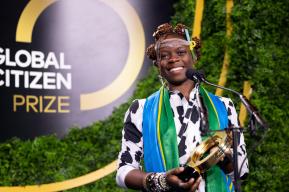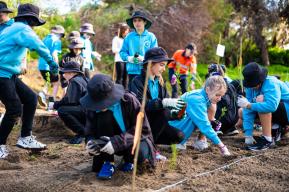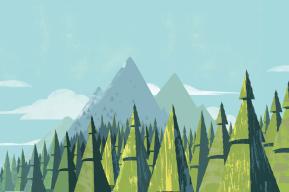According to the latest UNESCO study, only 19% of secondary school textbooks deal with the issue of biodiversity, which is too little compared to the climate emergency. Faced with the growing commitment of young people in favor of the environment and their fears for the future, teachers are on the front line to accompany them in their reflections. To overcome the disparities in access to resources on the subject, UNESCO organized for the first time a Campus, in the form of a Masterclass.
Five experts were brought together to meet the pedagogical needs of 250 French-speaking teachers from 32 different countries: France, Gabon, Senegal, Mali, Lebanon, Peru, Qatar, Portugal, Burundi, Canada...
A file of pedagogical resources prepared in collaboration with UNESCO and the experts was shared with the participants prior to the Masterclass to guide them on the themes addressed. Then a second one at the end of the exchanges focused more on implementing concrete practices with their students.
To open this session, Simon Klein, ecologist, doctor and scientific mediator at the Office for Climate Education (OCE) addressed eco-anxiety. Then the question of pedagogical methods to be implemented in schools was developed by Margarita Abakoya Nass, Education Director at EIT Climate-KIC. Yacine Aït Kaci, Artistic and Strategic Director at the ELYX Foundation, spoke about the commitment of youth. Finally, Lotfi Ben Hamadi, President of Wallah We Can, highlighted good practices for greening schools. Vincent Berthe, Editor-in-Chief of So Good Radio, concluded by giving keys to help young people to be better informed.
- To better detect eco-anxiety, develop empathetic listening to students' emotions. For example, propose exchange sessions on their good or bad news related to the climate which generates both fears and actions.
- Democratize the establishment of eco-delegates in all classes, then encourage them to propose projects and support them in their implementation according to the means available and the reality of local constraints.
- Develop projects to make schools more self-sufficient, reduce their environmental impact, and transform them into places of innovation and commitment. In this way, young people can be more active agents of change.
- Multiply media education workshops in schools to enable students to better understand how information flows and give them access to reliable, quality sources.
Recognize and try to limit eco-anxiety
Today, about 45% of 16-25-year-olds suffer from eco-anxiety. This anxiety is defined as an anticipatory fear of the effects of climate change. For teachers, the main problem is: how to detect this fear? Simon Klein, ecologist, notes that "the emotional question is very little treated in our society", one of the solutions would be first to open the place to a collective listening of emotions, good or bad.
Should we fear a generalization of the Greta Thumberg syndrome (if I may say so) in our schools?
Indeed, teachers sometimes find that they lack knowledge when faced with students with growing climate literacy. According to the ecologist, "the commitment of young people is very much inherent to the age of the adolescent", it is necessary to welcome all the dimensions of motivation of these students to enable them to implement concrete actions.
Youth engagement in schools
Margarita Abakoya Nass is Education Director at EIT Climate-KIC, in charge of a cross-sectoral and cross-organizational European educational program, bringing together academic, research, and innovation actors. According to her, it is important to bring environmental issues back into all school subjects: "using mathematics to make climate forecasts, in geography observing the concrete impact on territories, etc.".
Initiatives confirmed by Yacine Aït Kaci, according to whom the most important Sustainable Development Goal (SDG) is perhaps cooperation: "environmental issues are global". There is a need for dialogue and transdisciplinarity between colleagues and issues. "It may seem counter-intuitive to work on gender or rights issues when everything is always linked to the environment", hence the interest, according to him, of the eco-delegates who allow for more horizontal exchanges between subjects. They also make it possible to extend the actions beyond the school framework, the young people being the first prescribers of their parents.
Why make efforts when the governments that should be imposing tighter restrictions are not doing enough and our actions do not have as much impact as we would like?
According to Yacine Aït Kaci, the traditional governments "are in the emergency of problems so there is a need for citizen movements, new organizations, more decentralized not to forget the immense power of citizens". Nevertheless, in the face of the diversity of teachers, realities, and living environments shared during this Masterclass, he emphasized a common reality: "There is a real deficit of a positive imagination in this landscape of contradictory actions between citizens and governments."
The development of green schools
Lotfi Ben Hamadi is the creator and president of the pilot boarding school Wallah We Can with the objective of making a school of 570 students in the northwest of Tunisia, in Makthar, autonomous in energy and food. Thanks to the acquisition of 8 hectares of land near the boarding school on which the parents of the students who do not work have begun to be trained to produce the vegetables and fruits necessary to feed the students.
How can your project be used by other schools? Have the students and actors of this project been able to pass on their knowledge to their peers?
With this project, he aspires to get back on track with social justice by providing students who have taken ownership of their school with environmental knowledge, agriculture, and self-sufficiency... An environmental project that can be transmitted in various models to adapt to local realities.
Promoting media education
"You have to consider a young person in the news, like someone who catches an episode of a show in progress", notes Vincent Berthe, Editor-in-Chief of So Good Radio. According to this journalist, it is essential to better consume information. Today, we are all over-solicited and victims of "infobesity" because we consume short, often anxiety-inducing formats. The importance of media education in schools is underlined, to allow young people to understand the good practices to inform themselves.
For journalists, he points out the need to show scientific reality and to let the public make up its own mind, by multiplying its media sources and consulting fact-checking agencies. For students less familiar with traditional media, Vincent Berthe also mentions the content of citizens who do not claim to be journalists but who use codes that are more adapted to a young audience, such as the Nowu platform or the content of activists Camille Etienne or Johan Reboul.
Should we increase the number of local radio channels, for young people, in the languages they know and adapted to the environmental problems they face?
Yes, for Vincent Berthe, "there is a need for a local incarnation with field work" to allow the public to avoid the law of the death mile: the more information is physically distant, the less we feel concerned by it.
- This event was realized with the support of Tech4All and 6C Conseil
- Discover the next dates of the UNESCO Campuses: https://www.unesco.org/en/campus










